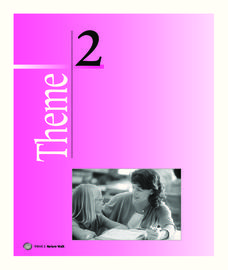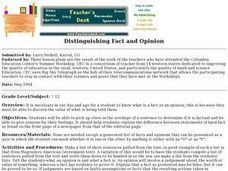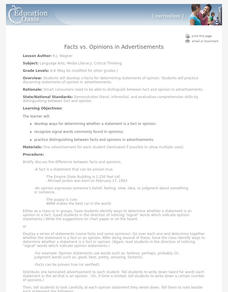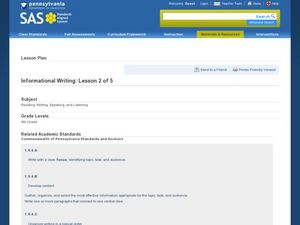Florida Center for Reading Research
Fact Versus Opinion
Is that a fact or an opinion? Learners explore the difference using this pocket chart activity during which partners read statement cards and determine whether they are facts or opinions.
E Reading Worksheets
Fact and Opinion - Worksheet: 3
How can you prove a fact? With supporting evidence, of course. Learners read 25 statements and determine if it is fact or opinion. Then, if the statement is a fact, youngsters write a sentence explaining how they can prove it.
E Reading Worksheets
Fact and Opinion - Worksheet: 1
Pupils identify fact and opinion statements with a language arts activity. Then, they explain their thinking in a sentence, including the clues or set of words that helped them arrive at their answer.
E Reading Worksheets
Fact and Opinion - Worksheet: 6
Practice discerning fact and opinion with a worksheet that contains 25 statements. Once learners determine if they are fact or opinion, they circle their answer and write a sentence explaining how they know.
E Reading Worksheets
Fact and Opinion - Worksheet: 2
After reading a statement, learners decide if it is a fact or opinion. Then, they write a sentence explaining how they know their answer is correct. The sheet contains 25 fact and opinion sentences.
E Reading Worksheets
Fact and Opinion - Worksheet: 4
Instruct pupils to determine if a statement is a fact or an opinion with a language arts activity. After reading the sentence and circling the answer, learners explain how they know their answer is correct.
Curated OER
Fact Versus Opinion
Young learners distinguish statements as fact or fiction. After exploring a newspaper, they determine the type of information it contains. They read editorial articles and discuss the differences between the editorial page and the front...
Curated OER
Fact and Opinion: How to Tell the Difference
Students explore reasoning by completing a worksheet activity in class. In this fact vs. opinion lesson, students identify the differences between a personal opinion and something that is factually true. Students identify several...
Curated OER
Lesson 3: Proving Facts and Forming Opinions
Time for Kids: Butterflies is used to model the process of determining if a text is based on fact or opinion. Children are taught how to skim for key words, and use headings or chapter names to locate proof of whether or not what they...
Curated OER
Fact V. Opinion
Students use statements out of newpapers to distinguish between facts and opinions. They discuss these differences as well.
Curated OER
Distinguish Fact from Opinion in Passage
Is it a fact or is it an opinion; readers need to know. Second graders learn a new technique to determine if a sentence or reading passage is fact based or opinion based. They read and then ask evidence based questions to determine if...
Curated OER
Is It What I Think of What I Know? (Fact and Opinion)
Young scholars analyze the difference between facts and opinions. In this fact or opinion lesson, students talk about the difference between factual information and opinions. They complete a fact or opinion chart, and describe how they...
Houghton Mifflin Harcourt
Nature Walk: Extra Support Lessons (Theme 2)
Reinforce concepts such as long vowels, spelling patterns, sound clusters, double-final consonants, and syllables with a nature-themed unit. Through a series of extra support lessons, learners compare and contrast using a Venn diagram,...
Curated OER
Fact and Opinion Race
Third graders differentiate between fact and opinion. They determine if a statement is a fact or an opinion. Students race to be the first team to make it to the finish line while determining if statements are facts or opinions.
DePaul University
Chicago Changes
Scholars determine statements as fact or opinion in a practice page consisting of two reading passages followed by multiple choice and short answer questions. Fact and opinion passages detail information about Chicago and Ethiopia.
Curated OER
Distinguishing Fact and Opinion
Students pick up clues in the wordage of a sentence to determine if it is factual and give reasons for their feelings. They explain difference between statements of hard fact as found on the front page of a newspaper from that of an...
Curated OER
Facts vs. Opinions in Ads
Pupils develop criteria for determining statements of opinion. They practice discerning statements of opinions in advertisements.
Curated OER
Is That a Fact, Harry?
Learners use excerpts from books to determine whether sentences are fact, fiction, or opinion. They state reasons for their choices.
Curated OER
Landform Bingo
Students review landform terms and review fact and opinion. They make fact and opinion statements and play landform BINGO.
Curated OER
What Has Brown Done for You?
Learners review the facts of the court case Brown v. Board of Education. Next, they research recent court cases that uphold contrasting views on the landmark decision. They write opinions about these recent court cases from a 1954...
Virginia Department of Education
The Writing Process for Persuasive Writing
Get your junior high writers stimulated with the strategies and ideas available in this activity. Learners discuss and debate controversial subjects, and outline their reasons with an online graphic organizer (link included) that creates...
Curated OER
Conversation Lesson: The Necessity of Grammar
Start a conversation to convey proper English grammar. In groups pupils voice their opinion, have well supported disagreements, and explain why they feel as they do. This lesson builds academic discussion skills and fosters a command of...
Curated OER
Elaborating the Main Idea, Using Supporting Details
A desk is used as a visual analogy to construct the main idea and supporting details in a story. The top of the desk is the main idea, and each of the four legs provides supporting details. The legs of the desk provide support for the...
Pennsylvania Department of Education
Informational Writing: Lesson 2 of 5
Introduce expository writing to your elementary learners. Young authors write a three-paragraph informational paper using the steps of the writing process. They follow guided lessons to experience each of five steps. Included are tons of...

























